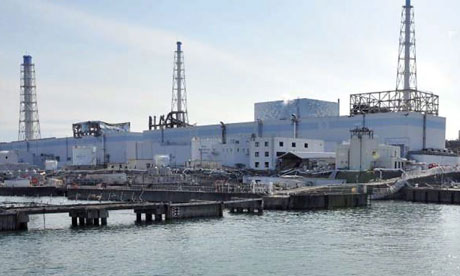Japan's Fukushima plant evacuated after new earthquake
Powerful 7.1 magnitude quake shook north-east part of country, but fears that it would trigger a tsunami have subsided

Workers at the Fukushima Daiichi nuclear plant were forced to leave the site following a powerful quake. Photograph: EPA
Workers at the Fukushima Daiichi nuclear plant were forced to evacuate on Thursday night after a powerful earthquake shook northeast Japan, almost a month to the day since the region was hit by a quake and tsunami that killed an estimated 28,000 people.
Fears that the magnitude 7.1 quake, the strongest since the tsunami, would set off another series of huge waves subsided with the lifting of a tsunami warning about 90 minutes later.
The nuclear plant's operator, Tokyo Electric Power, said Thursday's earthquake had not caused further damage to the facility, adding that workers battling to cool down overheating reactors had temporarily retreated to an on-site quake-resistant shelter.
The latest earthquake caused power outages across a wide area of northern Japan and knocked out several power lines at Onagawa nuclear power station north of Sendai city.
One remaining power line continued to supply electricity as normal, and there have been no reports of abnormal radiation levels in the area.
The plant's spent fuel pools briefly lost cooling capacity but an emergency diesel generator quickly kicked in.
The earthquake struck 30 miles beneath the water off the coast of Sendai, about the same depth and location as the magnitude 9.0 quake on 11 March.
The earthquake hit shortly after 11.30pm local time. The violent shaking lasted about 30 seconds, hurling items on to the floor in the neighbourhood near the city's main railway station.
In Miyagi prefecture motorways were closed and bullet train services were partially suspended.
In Sendai hotel guests and diners filed on to streets, some clutching torches as they began walking home in near-darkness.
Sirens from emergency vehicles filled the air, but more than three hours later there were no reports of major damage.
Police and the fire service officials said they had received numerous calls about fires and gas leaks. NHK, Japan's public broadcaster, said seven people had been injured, two of them seriously.
The earthquake sent the dollar sliding against the yen and wiped out early gains in European stock markets.
The International Atomic Energy Agency said progress was being made to stabilise the Fukushima Daiichi plant, where workers have been injecting nitrogen into a reactor to prevent a potentially explosive build-up of hydrogen gas.
"The situation at the Fukushima Daiichi nuclear power plant remains very serious," Denis Flory, head of the IAEA's nuclear safety department, told reporters.
But he added: "There are early signs of recovery in some functions such as electrical power and instrumentation."
No comments:
Post a Comment